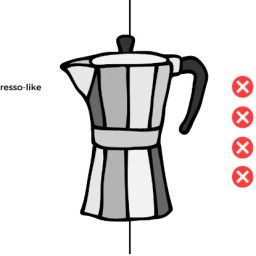
Single origin coffee refers to coffee beans sourced from a single geographical location, which could be a specific farm, a collection of nearby farms, or a region within a country. This distinct sourcing allows the coffee to exhibit flavor profiles unique to that area’s soil, climate, and altitude—factors that contribute to the coffee’s terroir. The result is a cup that not only tastes distinct but also tells a story of its origin.
In contrast, blended coffees combine beans from multiple locations. This method aims to create a consistent flavor profile from batch to batch. Blends can balance flavors and mask deficiencies, but they often lack the distinctiveness of single origin coffees, which can vary dramatically from season to season and harvest to harvest.
Key Takeaways
- Unique Flavor Profiles: Each single origin coffee brings a unique taste and aroma influenced by its terroir. These can range from floral and fruity to earthy and nutty, providing a diverse palette for the coffee enthusiast.
- Higher Traceability and Transparency: Knowing exactly where your coffee comes from enhances transparency and allows for better traceability. This is crucial for consumers interested in ethical sourcing and environmental impact.
- Support for Small-scale Producers: By purchasing single origin coffee, consumers can directly support small farmers and their communities, encouraging sustainable practices and economic stability in rural areas.
- Distinct Tasting Experience: For those looking to explore coffee beyond the usual blends, single origin offers a more personalized and educational tasting experience, allowing one to appreciate the subtle differences brought by geographical nuances.
Flavor and Aroma
The flavor and aroma of single origin coffee are profoundly influenced by the environment in which the coffee is grown. Factors like soil composition, altitude, and climate play significant roles in shaping the coffee’s character. For instance, volcanic soil often imparts a rich, intense flavor to coffee, while cooler highland climates might enhance its acidity, giving it a crisper taste.
Additionally, the way the coffee is processed after harvesting significantly affects its final flavor profile. There are three primary methods: natural, washed, and honey. Natural processing, where beans are dried inside the fruit, tends to produce a sweeter, fruitier coffee. Washed processing, where the fruit is removed before drying, results in a cleaner and more balanced cup. Honey processing, a hybrid method, leaves some of the fruit on the bean during drying, offering a sweet yet complex flavor with a slight hint of fruitiness. Each method can unveil different aspects of the coffee’s intrinsic taste, providing a unique experience.
Traceability and Transparency
Single origin coffee excels in its traceability and transparency, allowing consumers to know exactly where their coffee comes from. This traceability is not just about understanding the origin, but also about appreciating the journey from bean to cup. It ensures that consumers can verify the quality and the ethical standards of the coffee production.
This level of transparency supports ethical practices in the coffee industry. Consumers are increasingly interested in sustainable and fair trade practices, and single origin coffee provides this assurance. By choosing single origin, coffee lovers are often supporting smaller farms and communities, ensuring that farmers receive fair compensation for their labor and care.
This direct connection not only fosters a better economic environment for the producers but also encourages the adoption of sustainable farming practices that benefit both the land and the people who cultivate it.
Supporting Smaller Producers
Single origin coffee often brings significant benefits to small-scale producers. By focusing on coffee from one location, roasters and consumers are directly linked to the farmers who grow the beans. This connection typically results in fairer prices for the coffee, as the premium paid for single origin beans is usually higher than for blends. The increased income can lead to better living conditions for the farmers and their families.
Moreover, single origin coffee encourages sustainable practices. Farmers motivated by the potential for higher returns from premium markets are more likely to invest in environmentally friendly farming techniques. This not only improves the quality of the coffee but also enhances the sustainability of the land, ensuring that it can continue to produce high-quality coffee for years to come. Thus, buying single origin coffee can be a powerful way to support economic and environmental sustainability in coffee-growing regions.
Exploring the Popularity and Misconceptions
Single origin coffee has grown in popularity, but it also comes with its share of misconceptions. One common myth is that single origin coffee is always superior to blends in terms of quality. While single origin coffees do offer unique flavor profiles that reflect their specific growing conditions, this doesn’t inherently make them better. Quality in coffee can depend on many factors including the skill of the farmer, the precision of the harvest, and the method of processing.
Another misconception is about the price. Single origin coffees are often more expensive than blends, but this is not solely due to better quality; it’s also because they are less commonly produced and more costly to source due to their specific origins. Additionally, blends can be crafted to create a balanced, complex coffee that might be preferred by some consumers for certain uses, like espresso where a fuller, more balanced flavor profile is often desired.
FAQs
What defines a coffee as single origin?
Single origin coffee is defined by its exclusivity to one particular location. This can range from a single farm, a collection of farms within a close geographic area, or a specific region within a country. The key is that all the beans come from the same place, providing a unique taste profile characteristic of that area.
How does single origin coffee support sustainable practices?
Single origin coffee often supports sustainable practices by promoting environmental stewardship and social responsibility. Farmers involved in producing single origin coffee are usually encouraged to use sustainable farming methods to maintain the high quality required. This includes practices like shade growing, organic farming, and water conservation. Additionally, fair trade practices are common, ensuring fair wages and better working conditions for the farmers.
Can single origin coffee vary in taste from year to year?
Yes, the taste of single origin coffee can vary from year to year due to changes in climate, soil conditions, and farming techniques. This variability is part of what makes single origin coffee so unique, as each harvest offers a new and distinct flavor profile based on that year’s growing conditions.
Final Thoughts
Single origin coffee offers a distinctive journey through its unique benefits and sensory experiences. Each cup reflects its origins, telling a story of its terroir, from the soil and climate to the care and craft of the farmers. For those eager to delve deeper into the world of coffee, single origin beans provide an enlightening perspective on how diverse coffee flavors can be.









